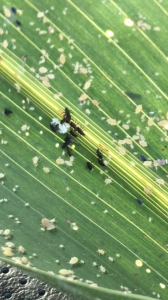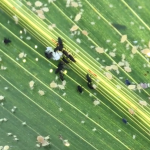Scouting Necessary, but SCA Thresholds Remain Low in 2017—So far this year sugarcane aphid (SCA) has only been a minor issue. Yields in the Rio Grande Valley up through Central Texas have generally been good with actual yields dependent on local rainfall amounts and timing. Best estimates to date are no more than 15 percent of the acres in South Texas were treated for SCA. Although SCA has been detected in Oklahoma fields for a few weeks now, numbers have stayed low with very little acreage actually needing to be treated.
Last week SCA infestations were found in the middle of the Texas Panhandle (Donley County) by a consultant. This is in a single isolated field but indicates scouting of sorghum fields for SCA should begin throughout the southern High Plains. New infestations have also been reported in Floyd and Crosby Counties, which are located just east and northeast of Lubbock, TX. More than likely there are infestations in other fields but populations are low enough that they are very hard to find. For more information on scouting and managing SCA visit the Sorghum Checkoff webpage and scroll through the abundance of written material and videos produced by the checkoff as well as multiple university entomologists.
Entomologists from across the country continue to do a good job in monitoring for SCA and reporting infestations to the K-State MyFields distribution map. Your effort is needed in keeping the map updated. Please report any new county SCA infestations to your regional extension entomologist, or if you prefer let me know.
There has been speculation as to why SCA populations have thus far been a minor problem this year. There are likely several reasons, but good management practices implemented by growers and consultants are certainly one of them. Many growers have elected to plant hybrids with some level of tolerance to SCA. Aphids multiply slower on these hybrids. Second, consultants and growers are scouting their fields and treating when thresholds are reached with the appropriate insecticides (Transform or Sivanto Prime). If treatment is necessary, applicators are using the proper nozzles and water volume to improve coverage. These management considerations are having the overall effect of keeping SCA numbers down in any given region while lowering the potential for SCA to infest other fields.
An interesting article written by Dr. Robert Bowling recently appeared in the Victoria Advocate titled ‘The rise and fall of the sugarcane aphid‘ that discusses why SCA was only a minor issue for south Texas sorghum growers this year.
What will happen with SCA in the coming weeks remains to be seen and is almost impossible to predict at this time. However, following the management guidelines that have been developed over the last two years will go a long way in leading to a successful season.

Sugarcane aphids and beneficials could be found on sorghum in San Patricio county in early May. Beneficials paired with treatment seem to have kept most SCA populations at bay this year.
Ag Leasing Workshops Scheduled—After such a positive response last ear, four new Rancher Leasing Workshops covering grazing, hunting and livestock leases are scheduled across the state by the Texas A&M AgriLife Extension Service. The free programs are funded by the Southern Extension Risk Management Education Center, said Tiffany Dowell Lashmet, AgriLife Extension agricultural law specialist in Amarillo.
“Last year, 100 percent of participants said they would recommend these programs to a friend, so we decided to offer them in more locations,” Lashmet said.
The schedule will be:
– Aug. 22, noon-4 p.m., Texas A&M AgriLife Research and Extension Center, 1102 E. Farm-to-Market Road 1294, Lubbock.
– Sept. 1, 8:30 a.m.-1 p.m., Hildebrand Equine Complex, 3240 F&B Road, College Station.
– Sept. 19, 8:30 a.m.-1 p.m., AgriLife Extension office for Frio County, 400 S. Pecan St., Pearsall.
– Oct. 19, 8:30 a.m.-1 p.m., Tom Green 4-H Center, 3168 N. U.S. Highway 67, San Angelo.
Lashmet said lunch will be provided by two sponsors: Ag Workers Insurance for the Lubbock, College Station and San Angelo programs, and Security State Bank for the Pearsall program. Participants will need to RSVP at least one week before the meeting they will attend to Kim Garcia, 806-677-5626 or kim.garcia@ag.tamu.edu. Each workshop will address the legal risks associated with agricultural leases, Lashmet said. The goal is to educate landowners and producers on the importance of utilizing written leases as a risk management tool. Joining Lashmet on the program will be AgriLife Extension economists from around the state.
“We will discuss the potential legal implications of failing to have a sufficient written lease and the potential legal issues and litigation that the development of written leases can help avoid,” she said. “The workshops will also familiarize participants with key terms and provisions that should be considered in lease negotiations.”
Participants will receive a leasing handbook that covers legal issues, designing lease payment structures and calculating payments, landowner liability, as well as checklists and sample lease forms for negotiating lease agreements.
Export Report—Sorghum exports remained strong this week with China committing to purchase two million bushels. This brings the total commitments for the year to 183.9 million bushels, 86 percent of the USDA export target. Exports are still ahead of the five-year average pace and very similar to last year’s pace. Deliveries were strong with shipments to China and Mexico totaling 2.1 million bushels. Prices on the Gulf Coast were stable for August delivery at 114 percent corn prices or $4.78. New crop interior bids remained steady.









